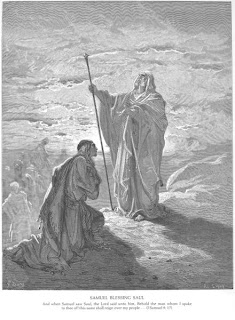
Most Christians who are familiar with the Bible are familiar with the story of Saul, the man who was chosen by God to be “prince” over God’s people
Enter: King Saul, a king who was specifically chosen by God, the “anointed” one, the new savior of God’s people.
He magnificently subjugated the Ammonites which greatly pleased the people of
Delighted with his success, he next took on the Philistines. His power and victory had gone to his head, which often happens when people are placed in positions of royal authority. Saul was now king and wanted to lead rather than follow the will of God. When war raged between the Philistines and
Saul made one more mistake that ended his kingship over
This is a much abbreviated version of King Saul’s rise and fall from kingship over the people of
To refresh our memories, Saul’s first mistake was when he offered sacrifices to God, thinking of it simply as a price to pay for something in return. In this case, he was paying for God to defeat the Philistines. Saul’s actions angered both God and Samuel, and he was told that his kingdom would not continue. Another man, not connected to Saul’s family line would take his place when he died. Saul was punished with loss of his future dynasty.
What lesson can we, hundreds of years later, pull from King Saul’s mistake? We should always act out of love for God and for each other, never doing gracious and loving things because of the reward we might receive. We should do it out of the kindness of our hearts, because we want what’s best for the other person. I will provide an example, with which I hope to better explain myself. Suppose I was to give one of my dearest friends an expensive gift. It would be the wrong attitude to expect a gift in return. The meaning of the gift would be of so much more value if I was to give it out of love for my friend, expecting nothing in return.
This lesson should be applied to our relationship with God. He gave us so much: a beautiful earth to live on with plants and animals. He gives us life and breath. He gave his life that we might be redeemed and one day live with him in eternal paradise. All he wants from us is that we love him with our whole soul, heart, and mind. He wants us to talk to him and frequently receive the sacraments which he so generously gave. We should love him for all these splendid things and expect nothing in return, because he has already given us so much! (Now, it is important that we ask God for things; that’s what he wants. At the same time, however, he wants us to pray in thanksgiving and with joyful hearts.)
In summary, we can learn from the mistakes that our predecessors made hundreds of years ago and use them to instruct us in the ways of our personal relationships with God who created us and loves us above all things. King Saul is one of these valuable examples. God expects us to praise him regularly in thanksgiving for all he has given us and he loves it when we ask him for things. King Saul, however, wasn’t honest about what he wanted. He offered God sacrifices because he wanted something in return. This was not an act of love, it was a selfish act and God saw the underlying truth.




3 comments:
Ummm you might want to check the font on this one. It looks like it's all in webdings, or whatever it's called.
Looking forward to reading!
Thanks, I'll see if I can fix it.
Very nice post. All better now.
Post a Comment